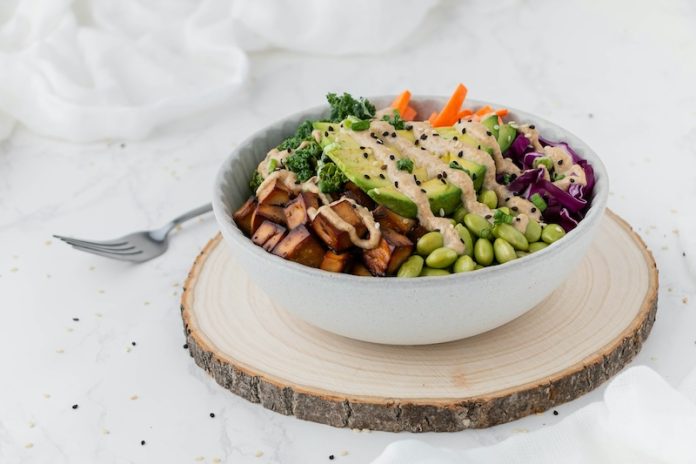
The vegan keto diet is a unique approach that combines veganism and the ketogenic diet.
Both diets have their specific guidelines and benefits, and merging them offers an interesting option for those looking to reduce their animal product intake while also aiming to consume fewer carbs.
Veganism avoids all animal products, focusing on plants for nutrition. On the other hand, the traditional ketogenic diet emphasizes high fat, moderate protein, and very low carbohydrate intake to induce a state called ketosis.
In ketosis, the body burns fat for energy instead of carbohydrates. Combining these two diets means focusing on plant-based, high-fat, low-carb foods.
Research shows that a vegan keto diet might offer several health benefits. For instance, it can lead to weight loss, improved heart health, and better blood sugar control.
A study published in the Journal of Nutrition and Diabetes suggested that a plant-based keto diet could help reduce the levels of total cholesterol and bad cholesterol (LDL), which are risk factors for heart disease.
The diet’s impact on weight control is another area of interest. By limiting carbs, the vegan keto diet forces the body to use fat as its primary energy source, which can lead to weight loss.
A review in the journal Nutrients highlighted that ketogenic diets are effective for weight loss in the short term. Combining this with a vegan diet, which is typically lower in calories and fats than diets including animal products, could enhance this effect.
However, adopting a vegan keto diet requires careful planning to ensure nutritional adequacy.
Common vegan sources of protein and carbs, like beans and grains, are often restricted on a keto diet due to their higher carb content. Therefore, it’s important to focus on low-carb, high-fat plant-based foods. These include:
- Nuts and seeds: Almonds, walnuts, flaxseeds, and chia seeds are excellent sources of fats and proteins with minimal carbs.
- Low-carb vegetables: Spinach, kale, broccoli, and cauliflower are staples in this diet for their low carb content and high nutritional value.
- Healthy oils: Coconut oil, olive oil, and avocado oil are crucial for ensuring sufficient fat intake.
- Avocados: Rich in fat and low in carbs, avocados are ideal for the vegan keto diet.
- Vegan dairy substitutes: Coconut cream, vegan cheeses, and unsweetened almond milk can replace dairy while maintaining low carb intake.
Despite its benefits, the vegan keto diet has potential drawbacks. Nutrient deficiencies are a concern, especially for vitamins B12, D, and minerals like iron and calcium, typically abundant in animal products. Supplements and fortified foods become important in such cases.
Moreover, the diet’s restrictive nature can make it challenging to maintain. Social situations, dining out, and simply enjoying a varied diet can be more complicated when adhering to strict vegan and keto guidelines.
In conclusion, the vegan keto diet is a fascinating merge of two popular eating styles, offering benefits such as weight loss and improved heart health. However, it requires careful planning to avoid nutritional deficiencies and ensure it’s a sustainable lifestyle choice.
As always, it’s recommended to consult with a healthcare provider before starting any new diet, especially one as specific as the vegan keto diet.
Follow us on Twitter for more articles about this topic.
Copyright © 2024 Scientific Diet. All rights reserved.





